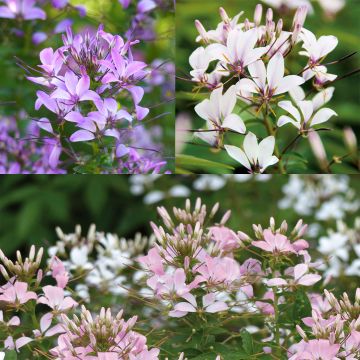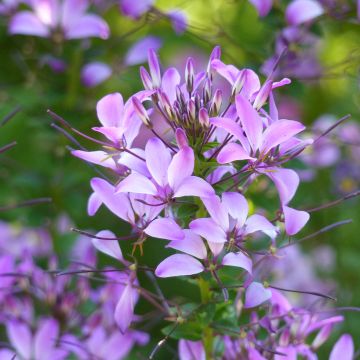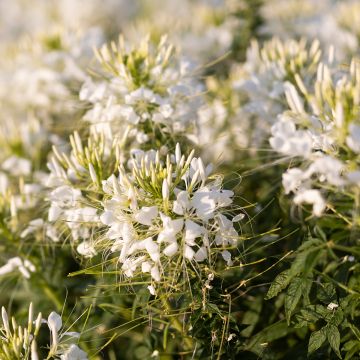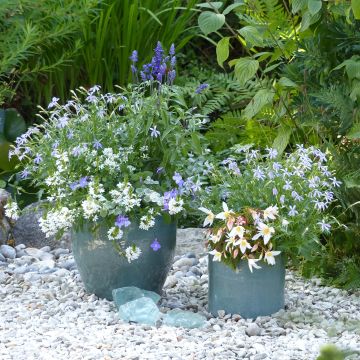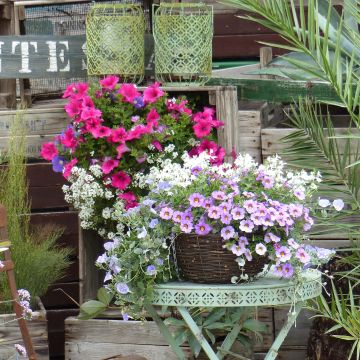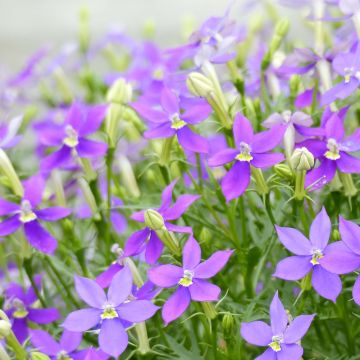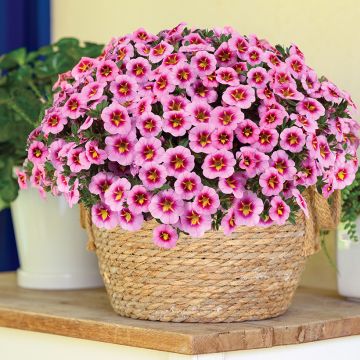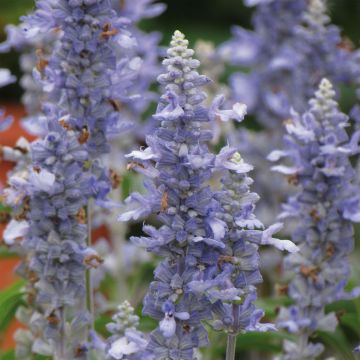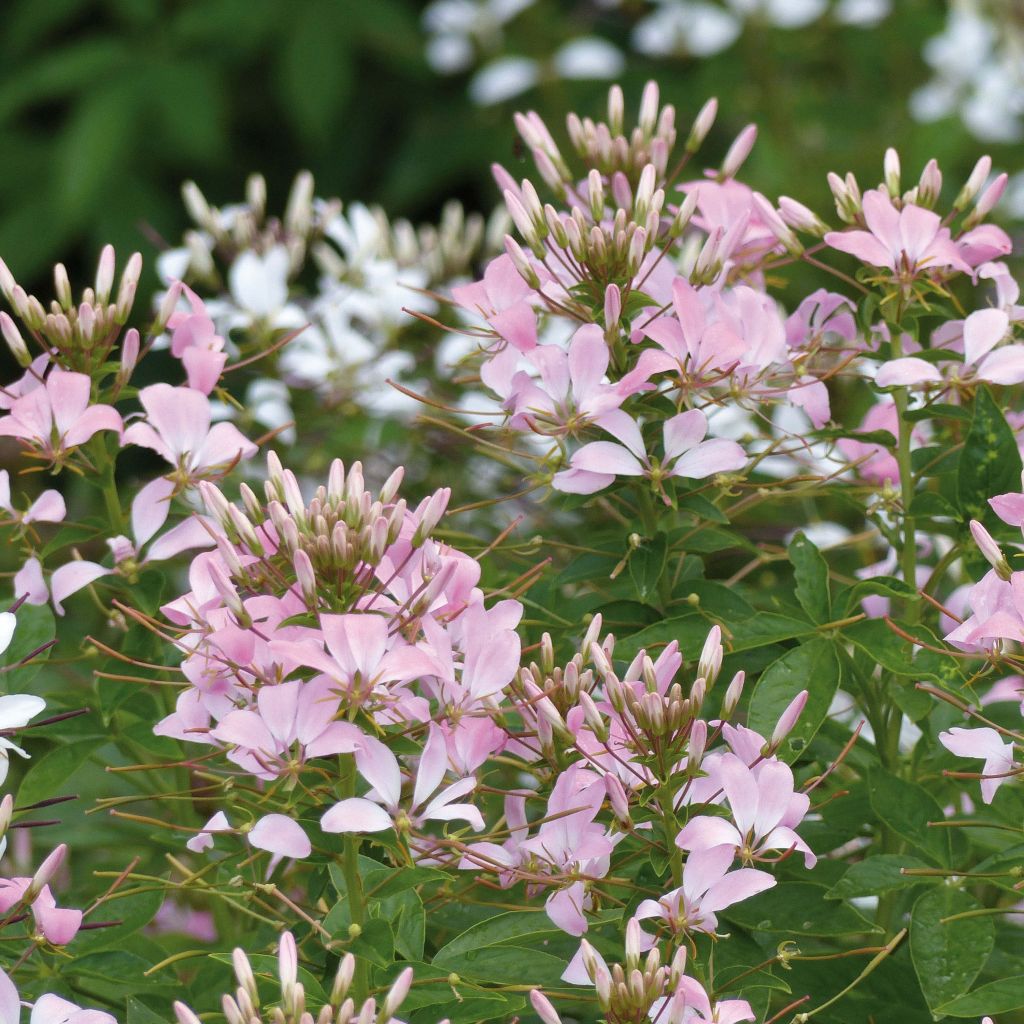

Cleome Señorita Carolina
Cleome Señorita Carolina
Cleome hassleriana Senorita Carolina
Spider flower
Very disappointed by these tiny naked young plants and not in very good condition...
Marie-Christine, 29/05/2023
This item cannot be shipped to the selected country
Delivery charge from €5.90
Delivery charge from €5.90
More information
Schedule delivery date,
and select date in basket
This plant carries a 6 months recovery warranty
More information
We guarantee the quality of our plants for a full growing cycle, and will replace at our expense any plant that fails to recover under normal climatic and planting conditions.
From €5.90 for pickup delivery and €6.90 for home delivery
Express home delivery from €8.90.
From €5.90 for pickup delivery and €6.90 for home delivery
Express home delivery from €8.90.
Does this plant fit my garden?
Set up your Plantfit profile →
Description
Cleome Señorita Carolina, also known as spider flower, is an annual plant with a bushy habit, offering spider-like flowers topped with prominent, infinitely refined stamens. Its candy-pink inflorescences bloom from May to October above a compact, vibrant green vegetation devoid of thorns. This fast-growing plant is perfect for creating romantic pots and adding a touch of lightness to borders. It should be grown in full sun, in moist and light soil.
Cleome Señorita Carolina originates from a less hardy plant native to subtropical regions of South America, called Cleome hassleriana. It is a cousin of the caper, both belonging to the caper family, and it can be found naturalised in other parts of the world, in fallow fields and on low-lying slopes.
The Señorita Carolina variety quickly forms a dense bushy clump, reaching 60 cm (23.6 in) in height and 30 cm (11.8 in) in width. On rather rough stems, but without thorns, large dark green palmate leaves unfurl, divided into 5 to 7 sharply pointed leaflets with long petioles. Its flowering period is particularly long, starting in May and continuing until October. The inflorescences are unique, remarkable for their architecture and lightness. The flowers are long-petioled, grouped in slightly fuzzy terminal spikes, and slightly fragrant. Each flower is composed of four candy-pink petals narrowing into pedicels at their base, with very long stamens and styles that extend well beyond the corolla, resembling egret plumes. The flowers develop and bloom one after the other, from the bottom to the top of the inflorescence. The fruits that follow the flowers are also unique: they are long, thin pods measuring 6-12 cm (2.4-4.7 in), suspended from the petioles. Sometimes, flowers and fruits can be observed on the same plant. It is the appearance of these fruits that gave the cleome its name of spider plant or spider flower: the numerous siliques resemble spider legs.
Cleomes are among the most beautiful annual flowers. For a beautiful effect, plant Cleome Señorita Carolina in the middle of a flower bed, alongside pennisetums. Planted together, or with other tall summer flowers (cosmos, Buenos Aires verbenas, Oriental poppies... ), they will provide volume and a lot of lightness. This compact variety does not require staking and allows for beautiful flowering pots, for example with tibouchinas.
Note: Please be aware that our young plants in mini-pots are professional products intended for experienced gardeners: upon receipt, transplant and store them under shelter (veranda, greenhouse, cold frame... ) at a temperature above 14 °C (57.2 °F) for a few weeks before being planted outdoors once all risk of frost has definitively passed.
Report an error about the product description
Flowering
Foliage
Plant habit
Botanical data
Cleome
hassleriana
Senorita Carolina
Capparaceae
Spider flower
Cultivar or hybrid
Other Cleome
Planting and care
Cleome Señorita Carolina enjoys the sun, as well as fresh, soft, humus-bearing and well-drained soils, without too much limestone. Planting is done in spring (April-May) when the sun begins to warm the air and frost is no longer a concern. Cleomes need space: plant them every 50 cm (19.7 in). Water and then apply a mulch to keep the roots cool.
Planting period
Intended location
Care
-
, onOrder confirmed
Reply from on Promesse de fleurs
Plug plants - Annuals
Haven't found what you were looking for?
Hardiness is the lowest winter temperature a plant can endure without suffering serious damage or even dying. However, hardiness is affected by location (a sheltered area, such as a patio), protection (winter cover) and soil type (hardiness is improved by well-drained soil).

Photo Sharing Terms & Conditions
In order to encourage gardeners to interact and share their experiences, Promesse de fleurs offers various media enabling content to be uploaded onto its Site - in particular via the ‘Photo sharing’ module.
The User agrees to refrain from:
- Posting any content that is illegal, prejudicial, insulting, racist, inciteful to hatred, revisionist, contrary to public decency, that infringes on privacy or on the privacy rights of third parties, in particular the publicity rights of persons and goods, intellectual property rights, or the right to privacy.
- Submitting content on behalf of a third party;
- Impersonate the identity of a third party and/or publish any personal information about a third party;
In general, the User undertakes to refrain from any unethical behaviour.
All Content (in particular text, comments, files, images, photos, videos, creative works, etc.), which may be subject to property or intellectual property rights, image or other private rights, shall remain the property of the User, subject to the limited rights granted by the terms of the licence granted by Promesse de fleurs as stated below. Users are at liberty to publish or not to publish such Content on the Site, notably via the ‘Photo Sharing’ facility, and accept that this Content shall be made public and freely accessible, notably on the Internet.
Users further acknowledge, undertake to have ,and guarantee that they hold all necessary rights and permissions to publish such material on the Site, in particular with regard to the legislation in force pertaining to any privacy, property, intellectual property, image, or contractual rights, or rights of any other nature. By publishing such Content on the Site, Users acknowledge accepting full liability as publishers of the Content within the meaning of the law, and grant Promesse de fleurs, free of charge, an inclusive, worldwide licence for the said Content for the entire duration of its publication, including all reproduction, representation, up/downloading, displaying, performing, transmission, and storage rights.
Users also grant permission for their name to be linked to the Content and accept that this link may not always be made available.
By engaging in posting material, Users consent to their Content becoming automatically accessible on the Internet, in particular on other sites and/or blogs and/or web pages of the Promesse de fleurs site, including in particular social pages and the Promesse de fleurs catalogue.
Users may secure the removal of entrusted content free of charge by issuing a simple request via our contact form.
The flowering period indicated on our website applies to countries and regions located in USDA zone 8 (France, the United Kingdom, Ireland, the Netherlands, etc.)
It will vary according to where you live:
- In zones 9 to 10 (Italy, Spain, Greece, etc.), flowering will occur about 2 to 4 weeks earlier.
- In zones 6 to 7 (Germany, Poland, Slovenia, and lower mountainous regions), flowering will be delayed by 2 to 3 weeks.
- In zone 5 (Central Europe, Scandinavia), blooming will be delayed by 3 to 5 weeks.
In temperate climates, pruning of spring-flowering shrubs (forsythia, spireas, etc.) should be done just after flowering.
Pruning of summer-flowering shrubs (Indian Lilac, Perovskia, etc.) can be done in winter or spring.
In cold regions as well as with frost-sensitive plants, avoid pruning too early when severe frosts may still occur.
The planting period indicated on our website applies to countries and regions located in USDA zone 8 (France, United Kingdom, Ireland, Netherlands).
It will vary according to where you live:
- In Mediterranean zones (Marseille, Madrid, Milan, etc.), autumn and winter are the best planting periods.
- In continental zones (Strasbourg, Munich, Vienna, etc.), delay planting by 2 to 3 weeks in spring and bring it forward by 2 to 4 weeks in autumn.
- In mountainous regions (the Alps, Pyrenees, Carpathians, etc.), it is best to plant in late spring (May-June) or late summer (August-September).
The harvesting period indicated on our website applies to countries and regions in USDA zone 8 (France, England, Ireland, the Netherlands).
In colder areas (Scandinavia, Poland, Austria...) fruit and vegetable harvests are likely to be delayed by 3-4 weeks.
In warmer areas (Italy, Spain, Greece, etc.), harvesting will probably take place earlier, depending on weather conditions.
The sowing periods indicated on our website apply to countries and regions within USDA Zone 8 (France, UK, Ireland, Netherlands).
In colder areas (Scandinavia, Poland, Austria...), delay any outdoor sowing by 3-4 weeks, or sow under glass.
In warmer climes (Italy, Spain, Greece, etc.), bring outdoor sowing forward by a few weeks.




































